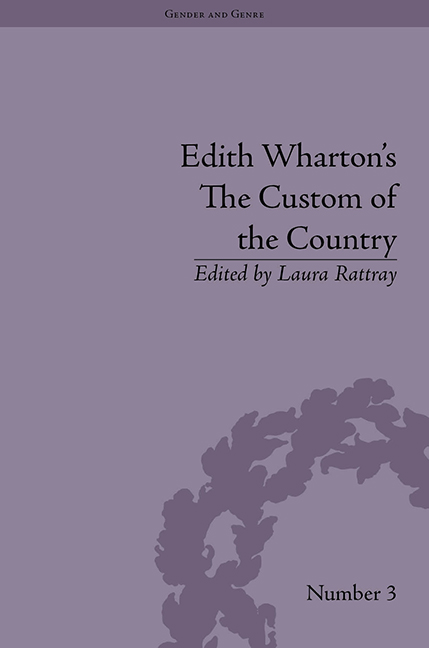Book contents
- Frontmatter
- CONTENTS
- Acknowledgements
- Editorial Note
- List of Contributors
- List of Figures
- Introduction
- 1 The Custom of the Country: Edith Wharton's Conversation with the Atlantic Monthly
- 2 When the Reading Had to Stop: Readers, Reading and the Circulation of Texts in The Custom of the Country
- 3 ‘Don't Cry – it ain't that Kind of a Story’: Wharton's Business of Fiction, 1908–12
- 4 Worst Parents Ever: Cultures of Childhood in The Custom of the Country
- 5 Crude Ascending the Staircase: Undine Spragg and the Armory Show
- 6 ‘It's Better to Watch’: Compulsive Voyeurism in The Custom of the Country and The House of Mirth
- 7 A ‘Mist of Opopanax’: Mapping the Scentscape of The Custom of the Country
- 8 Landscape with the Fall of Undine
- 9 Girls from the Provinces: Wharton's Undine Spragg and Cather's Thea Kronborg
- 10 Men at Work in The Custom of the Country
- 11 ‘Lost in Translation’: Financial Plots and the Modernist Reader in The Custom of the Country
- Notes
- Index
10 - Men at Work in The Custom of the Country
- Frontmatter
- CONTENTS
- Acknowledgements
- Editorial Note
- List of Contributors
- List of Figures
- Introduction
- 1 The Custom of the Country: Edith Wharton's Conversation with the Atlantic Monthly
- 2 When the Reading Had to Stop: Readers, Reading and the Circulation of Texts in The Custom of the Country
- 3 ‘Don't Cry – it ain't that Kind of a Story’: Wharton's Business of Fiction, 1908–12
- 4 Worst Parents Ever: Cultures of Childhood in The Custom of the Country
- 5 Crude Ascending the Staircase: Undine Spragg and the Armory Show
- 6 ‘It's Better to Watch’: Compulsive Voyeurism in The Custom of the Country and The House of Mirth
- 7 A ‘Mist of Opopanax’: Mapping the Scentscape of The Custom of the Country
- 8 Landscape with the Fall of Undine
- 9 Girls from the Provinces: Wharton's Undine Spragg and Cather's Thea Kronborg
- 10 Men at Work in The Custom of the Country
- 11 ‘Lost in Translation’: Financial Plots and the Modernist Reader in The Custom of the Country
- Notes
- Index
Summary
Six years after the publication of The Custom of the Country, Edith Wharton wrote in her First World War propagandist tract French Ways and Their Meaning: ‘The French woman is distinctly more grown up than her American sister; and she is so because she plays a much larger and more interesting part in men's lives’. She also explains that France's social cohesion, expressed in rich cultural values and a stable national character, stems from something that Puritan America feared: ‘frank and free social relations between men and women’. Because French Ways was aimed at two specific contemporary readerships – primarily US troops arriving to serve on the Western Front who would be keen for tips in cultural comportment from a distinguished expatriate author, as well as a more discrete audience of French readers eager to see how Wharton would depict them – the text both exaggerates French national traits and attempts to be fair in its overview. Thus, she acknowledges that ‘The French are not generous, and they are not trustful’ and are ‘indifferent to the rights of others’ they are also ‘enslaved by social conventions’ – features readily discernible in the de Chelles family in The Custom of the Country. The thrust of Wharton's analysis in French Ways, however, rests on comparisons between French and American gender relations; and they provide insights that can be applied to the novel.
- Type
- Chapter
- Information
- Edith Wharton's The Custom of the CountryA Reassessment, pp. 143 - 156Publisher: Pickering & ChattoFirst published in: 2014



